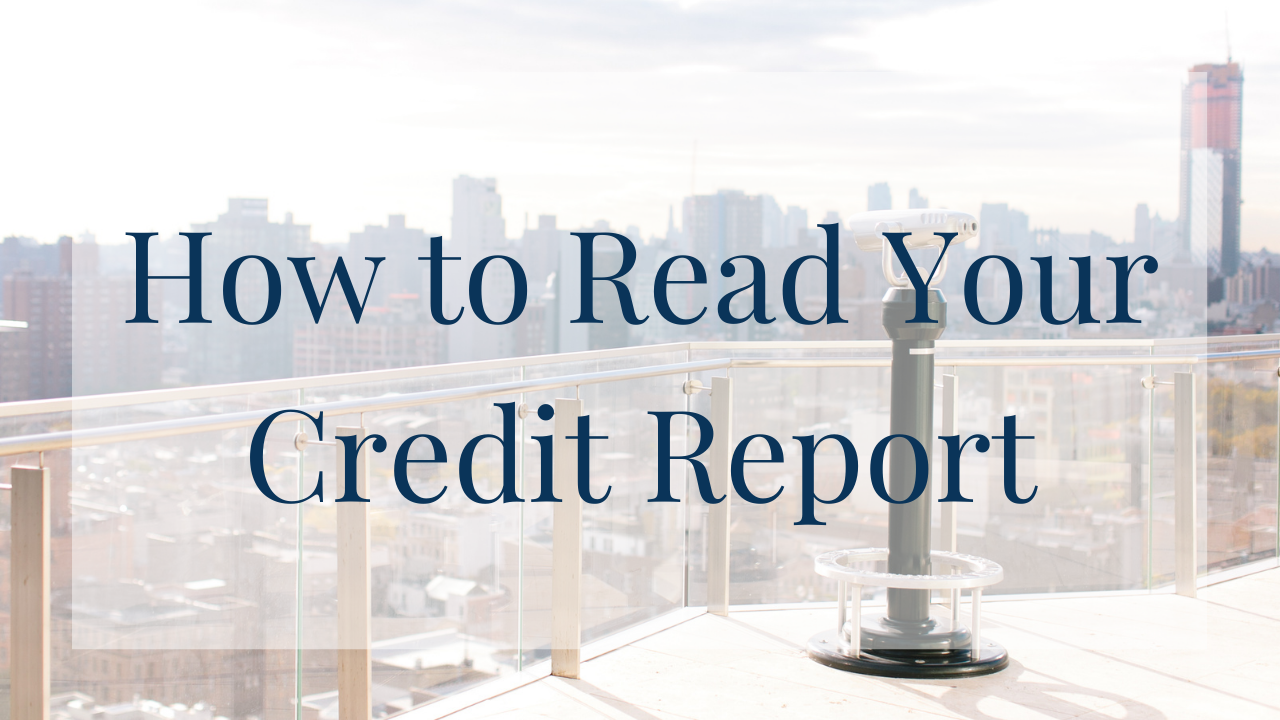How to Read Your Credit Report
If you’ve ever wondered...when did I get that car loan? Or, what year did we refinance the house? There is one place you can go to that ALWAYS has that information -- Your Credit Report!
What IS a Credit Report?
Your credit report is a document that contains and details all the different types of credit you’ve taken out and how well you did paying it back. Data Analytics companies like FICO (formerly, Fair, Isaac, and Company) gather data from banks, credit card companies, auto loan companies, etc and from all that data they issue a “credit score” based on how well you pay your bills. They sell this information to credit reporting agencies.
Credit reporting agencies, or credit reporting bureaus, combine and compile all of the historical data surrounding what loans and types of loans you’ve taken out and how well you paid them back. For example, did you make any late payments and how late were those payments?
Basically? Your credit report is like your financial report card.
There are three credit reporting agencies in the U.S.: Experian, Transunion and Equifax. Each one of these companies compiles a report, your credit report, and maintains it each year, although each one does it a bit differently.
The thing is….mistakes happen.
And, that’s why it’s super important to read your credit report each year. And, not just from one agency, but from each agency every year.
If you want to know more about your Credit Score and WHY you need to keep an eye on it go read this blog: What is a FICO Score or Credit Score and Why Do I CARE?
What’s On My Credit Report?
What is on your credit report? The loan for your house or your car, as well as all the credit cards you have now and any you’ve closed. Additionally, and something a lot of people don’t know, if you’ve ever been taken to court and been found guilty or at fault for something, that could be on your credit report as a Public Records notation.
Typically, items stay on your credit report for seven to ten years, depending on what it is. For example, accounts that went to collections can stay on your report for as long as seven years and bankruptcies for as long as ten years. If you’ve ever been sued for money and lost, those public records notations can also linger on your credit report for as long as ten years.
This means that not managing your money and your payments well can cause you problems for a very long time.
However, each credit reporting bureau is different, which is just another reason to look at your report regularly!
Where Do I Find My Credit Report?
Now that we’ve talked about the basics of credit reports, let’s talk about where to find it.
The BEST place I’ve found to get a totally free credit report is at www.annualcreditreport.com
This is the only site that I'm aware of that won’t require you to hand over your email address and then spam the crap out of you. Also, while I do sometimes have affiliate links in my blog posts, this is NOT an affiliate link**. I just want to give you the best possible information I can find.
When you go to www.annualcreditreport.com you can download your credit reports from one of the three credit reporting agencies: Experian, TransUnion or Equifax.
How Do I Read My Credit Report?
Regardless of which one you decide to go with, once you’ve downloaded it, you’re going to want to spend some time reading through all of it and verifying at least the following:
Your name, social security number, and other personally identifiable information is correct
All of the cards listed are yours
All of the cards listed as active are yours
That the outstanding balances on your cards are correct. (Note, any transactions within the last 30 days may not have been updated yet)
Mortgage amounts and balances are correct
Mortgages that have been refinanced have been closed
Car loan balances are correct and/or closed if they have been paid off
School loan balances are correct and/or closed if they have been paid off
Personal loan balances are correct and/or closed if they have been paid off
Verify that any noted late payments were actually late
I have a free Credit Report Review Checklist which you can download HERE.
In it, I walk you through the entire list of things to check for each credit report at each credit reporting agency. Go ahead and get it HERE, it’s totally free for you to use!
I also did a YouTube video on How to Read a Credit report and included my super simple system to review each of the three credit reports each year!
You can watch it here ⬇️
Want to keep learning about your Credit Report and Credit Score? Check out these blogs:
What is a FICO Score and Why do I care?
Everything You Need to Know About Your Credit Report
**I am not a licensed financial advisor. I am a money expert and I offer education, tips, tricks and my opinions around money. You should consult a professional who understands your needs in order to make the best decisions for you! Additionally, some links in this blog may be affiliate link, which means if you click the link and buy the product I may earn a small commission - at NO COST to You! It’s one of the ways I keep the lights on around here so TYIA! 😉







